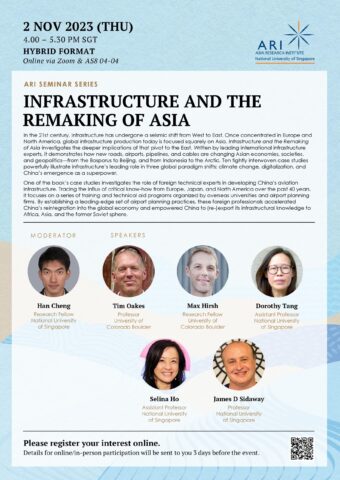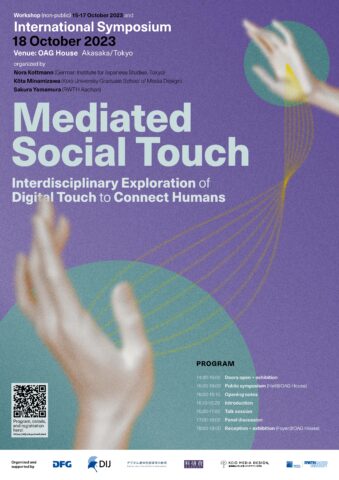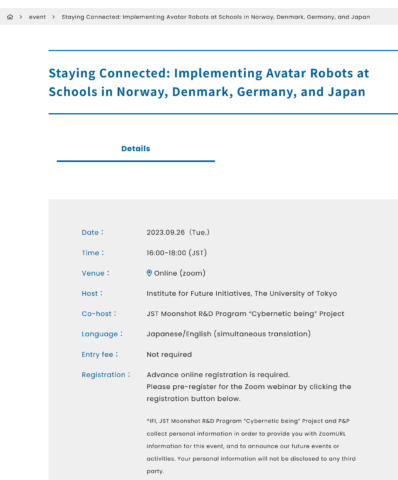イベント&アクティビティ
Online DIJ Study Group on Japan’s Economic Security Policy
 Germany, which has become accustomed to cheap gas from Russia, easy market access to China and peace and stability in Europe, has experienced a rude awakening. One of the most urgent tasks now is to ensure economic security. However, it is not the USA but Japan with its advanced system of economic security that seems to be the more appropriate role model. After all, Japan’s strong industrial production base, its export orientation and its positioning between economic dependence on China and security dependence on the USA are very similar to Germany’s situation. Against this background, the question arises as to which characteristics make the Japanese system of economic security so attractive from a German perspective? And how does Japan deal with the uncertainties, dilemmas and risks that state intervention in economic decision-making processes inevitably entails? Details and registration here
Germany, which has become accustomed to cheap gas from Russia, easy market access to China and peace and stability in Europe, has experienced a rude awakening. One of the most urgent tasks now is to ensure economic security. However, it is not the USA but Japan with its advanced system of economic security that seems to be the more appropriate role model. After all, Japan’s strong industrial production base, its export orientation and its positioning between economic dependence on China and security dependence on the USA are very similar to Germany’s situation. Against this background, the question arises as to which characteristics make the Japanese system of economic security so attractive from a German perspective? And how does Japan deal with the uncertainties, dilemmas and risks that state intervention in economic decision-making processes inevitably entails? Details and registration here
Hanns Günther Hilpert, German Institute for International and Security Affairs
Hybrid DIJ Study Group on National Identity Discourses in Japan

The Rugby World Cup held in Japan in 2019 was an intriguing example of a large-scale international sporting event that triggered national identity discourses. A multi-ethnic team which represented Japan with outstanding success, Japan’s national rugby team’s journey through the tournament was broadly covered in the media and the team was cheered on by fans across the country. Yet, the myth of mono-ethnicity still resonates with some segments in Japanese society. The resulting tension is brought into focus by intensive media reporting and can ultimately lead to a process of redefining a nation-state’s self-perception. This presentation will discuss the tensions between the assumed mono-ethnicity and the reality of a changing society. How does this discourse of national belonging in Japan take place? What is considered diverse in Japan and where do national and international reporting clash regarding Japanese national identity? Details and registration here
Jane Khanizadeh, LMU Munich/DIJ Tokyo
Isaac Gagné and Celia Spoden to give research presentations at the AAA Conference

DIJ researchers Isaac Gagné and Celia Spoden will attend this year’s annual meeting of the American Anthropological Association (AAA) in Toronto to present their latest research. Both will give presentations in the panel “Beyond ‘Lonely Death’: Communication and Engagement in Japan’s Aging Society” on November 17. Drawing from fieldwork in a hamlet in Nagano and the displaced district of Yuriage in Miyagi, Isaac’s paper (“Social Welfare of and for the Community: Neighborhoods, Networks, and Volunteerism in Aging Japan”) will discuss the roles of community-based social welfare services in aging suburban and rural communities. In her paper (“Cyber-Physical Spaces in Japan: Social Inclusion of People with Disabilities Through Avatar-Work”), Celia will present her fieldwork in an avatar café, where home-bound people remotely control robots and serve the guests. Drawing on interviews with the avatar pilots, she will explore their perception of social participation, work, and disability.
Hybrid Seminar ‘Infrastructure and the Remaking of Asia’

In the 21st century, infrastructure has undergone a seismic shift from West to East. Once concentrated in Europe and North America, global infrastructure production today is focused squarely on Asia. This hybrid seminar will introduce the open access book Infrastructure and the Remaking of Asia (University of Hawai’i Press 2023) which investigates the deeper implications of that pivot to the East. Written by leading international infrastructure experts, it demonstrates how new roads, airports, pipelines, and cables are changing Asian economies, societies, and geopolitics—from the Bosporus to Beijing, and from Indonesia to the Arctic. Ten tightly interwoven case studies powerfully illustrate infrastructure’s leading role in three global paradigm shifts: climate change, digitalization, and China’s emergence as a superpower. This event is part of the DIJ’s research partnership on Asian Infrastructures with the Asia Research Institute (ARI) at the National University of Singapore. Details and registration here
Workshop and public symposium on ‘Mediated Social Touch’
 What is the future role of mediated social touch for social inclusion and societal participation in the context of the increasing digitalisation and diversification of Japanese and German societies? The workshop and symposium Mediated Social Touch. Interdisciplinary Explorations of Digital Touch to Connect Humans will bring together experts and practitioners from social sciences, neuroscience, haptics and computer science/AI to gain a comprehensive and multi-perspective understanding of mediated social touch and its potential for connecting humans in a digitalized world. The public symposium on 18 October at the OAG Hall in Tokyo is preceded by a three-day internal workshop. The project is funded by the German Research Foundation (DFG) and the Japanese Society for the Promotion of Science (JSPS). Details and registration here
What is the future role of mediated social touch for social inclusion and societal participation in the context of the increasing digitalisation and diversification of Japanese and German societies? The workshop and symposium Mediated Social Touch. Interdisciplinary Explorations of Digital Touch to Connect Humans will bring together experts and practitioners from social sciences, neuroscience, haptics and computer science/AI to gain a comprehensive and multi-perspective understanding of mediated social touch and its potential for connecting humans in a digitalized world. The public symposium on 18 October at the OAG Hall in Tokyo is preceded by a three-day internal workshop. The project is funded by the German Research Foundation (DFG) and the Japanese Society for the Promotion of Science (JSPS). Details and registration here
Hybrid DIJ Forum on Germany’s New Security Policy and Japan’s Take

In February 2022, Germany’s Chancellor Olaf Scholz proclaimed a Zeitenwende (“epochal shift”) denoting a shift away from close economic ties with Russia and announcing a massive investment in Germany’s defense capabilities. These measures were meant to meet the economic and political challenges faced by a country that had previously relied on pacifist politics. Drawing on a historical perspective of Germany’s “long remilitarization” from the Korean War to the Armed Forces’ missions in Afghanistan and Mali, this talk will evaluate what the Zeitenwende means for Germany’s present and future with a particular focus on security policy. Professor Tokuchi will comment on Professor Leggewie’s presentation providing a Japanese view on the changing global security landscape. After the presentations, the discussion will be opened to the floor. The event will be followed by a networking reception. Details and registration here
Claus Leggewie, Giessen University
Hideshi Tokuchi, Research Institute for Peace and Security
Hybrid DIJ Study Group session on Spatial Dynamics in Japanese Poetry

The COVID-19 pandemic has had a profound impact on our understanding of space. However, the world of reading, an activity traditionally seen as a purely cognitive act that allows readers to leave their physical bodies behind, appeared to remain relatively unaffected by these spatial constraints. This interdisciplinary presentation will closely examine poetic works like Saihate Tahi’s site-specific installation Shi no kasoku / shi no teishi (2020), Fuzuki Yumi’s sound installation Koe no genba (2021), and the online exhibition Kakuri-shiki nōkōsesshoku-shitsu (2020) by Mizusawa Nao and media artist Fuse Rintarō to explore space, proximity, and the act of reading within the context of poetry installations. The presentation will suggest that their works create poetic spaces that serve as a poignant reminder of the readers‘ own physicality. As a result, readers become more aware to the spaces that surround them and the far-reaching effects of COVID-19 on these settings. Details and registration here
Sarah Pützer, University of Oxford/DIJ Tokyo
Celia Spoden to discuss avatar robots in schools in Germany

Avatar robots designed for children unable to attend school due to injury, illness, or disability have been increasingly adopted in Europe and Japan in recent years. The online event Staying Connected: Implementing Avatar Robots at Schools in Norway, Denmark, Germany, and Japan will show cases of avatar robots being introduced into educational environments in European countries and Japan, accompanied by discussions about their challenges and potential opportunities. It features presentations by Arisa Ema (University of Tokyo), Sofie Sejer Skoubo (Aarhus University), Marit Haldar, Maja Nordtug (both Oslo Metropolitan University), and DIJ’s Celia Spoden. The event is hosted by the University of Tokyo’s Institute for Future Initiatives (IFI) and takes place on Tuesday, 26 September 2023. Details and registration here





 Open Access
Open Access
